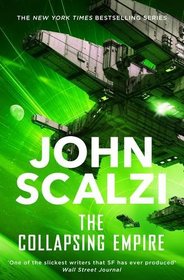This first of a trilogy is an example of great world-building. The physical characteristics of the Flow, the Interdependency of worlds, and the office of the Emperox (essentially the grand leader) are excellent and make for a compelling read. Scalzi sets up an impending collapse of interconnectivity of the empire, and I'm fascinated to see how it goes. I especially appreciated the strong women in the story. I already have the next book and will start it right away. 2018 Hugo Award Best Novel finalist and 2018 Locus Award winner.
Good political space opera, interesting concept of the Flow. I liked all the action, the main characters all seem pretty well drawn, but this story doesn't wrap up in the least. Not exactly a cliffhanger but it just ends in the middle of the action. I sure liked the premise but boy I'm getting tired of neverending series - hope Scalzi is not planning more than a trilogy here.
Good, old-fashioned Galactic Empire Space Opera, which (delightfully) isn't so old-fashioned.
I was greatly enjoying this, the first in a trilogy about the Interdependency, and the emerging tribulations of its interconnected network of planets, its wheeler-dealering aristocrats, and its freshly minted (and supremely reluctant) new "Emperox," Cardenia Wu, now Grayland II. And then I hit the last few pages, and it dawned on me what Scalzi was doing (Clever Mr. Scalzi!!) and I loved it even more. Like Dune, the great Galactic Empire Space Opera, this manages to be both totally ridiculous bubble-gum for the mind, with lots of completely anachronistic, and supremely unlikely, Imperial silliness and seemingly no redeeming features whatsoever, AND to suddenly spring it on you that there's a lot more there to think about than you first realized.
Think about it -- a looming ecological (of sorts) disaster, which most of the Powers That Be are in ostrich-like denial about, and refuse to act upon, even as it's obvious that it will destroy everything that they know, and it's almost too late. Oooh, where do I recognize THAT from ... ?
Also achieved what is, for me, the rare reaction to the first book in a trilogy that I want to run out and grab Volume 2, right now. Enjoyable characters (even the evil ones), intriguing premise. Good handling of unexpected twists. And Scalzi's brisk sense of humor -- which doesn't always work for me -- keeps some of the Imperial trappings in their place, rather than diving into Dune-like ponderousness.
Yes, this will do, very nicely ...
I was greatly enjoying this, the first in a trilogy about the Interdependency, and the emerging tribulations of its interconnected network of planets, its wheeler-dealering aristocrats, and its freshly minted (and supremely reluctant) new "Emperox," Cardenia Wu, now Grayland II. And then I hit the last few pages, and it dawned on me what Scalzi was doing (Clever Mr. Scalzi!!) and I loved it even more. Like Dune, the great Galactic Empire Space Opera, this manages to be both totally ridiculous bubble-gum for the mind, with lots of completely anachronistic, and supremely unlikely, Imperial silliness and seemingly no redeeming features whatsoever, AND to suddenly spring it on you that there's a lot more there to think about than you first realized.
Think about it -- a looming ecological (of sorts) disaster, which most of the Powers That Be are in ostrich-like denial about, and refuse to act upon, even as it's obvious that it will destroy everything that they know, and it's almost too late. Oooh, where do I recognize THAT from ... ?
Also achieved what is, for me, the rare reaction to the first book in a trilogy that I want to run out and grab Volume 2, right now. Enjoyable characters (even the evil ones), intriguing premise. Good handling of unexpected twists. And Scalzi's brisk sense of humor -- which doesn't always work for me -- keeps some of the Imperial trappings in their place, rather than diving into Dune-like ponderousness.
Yes, this will do, very nicely ...




